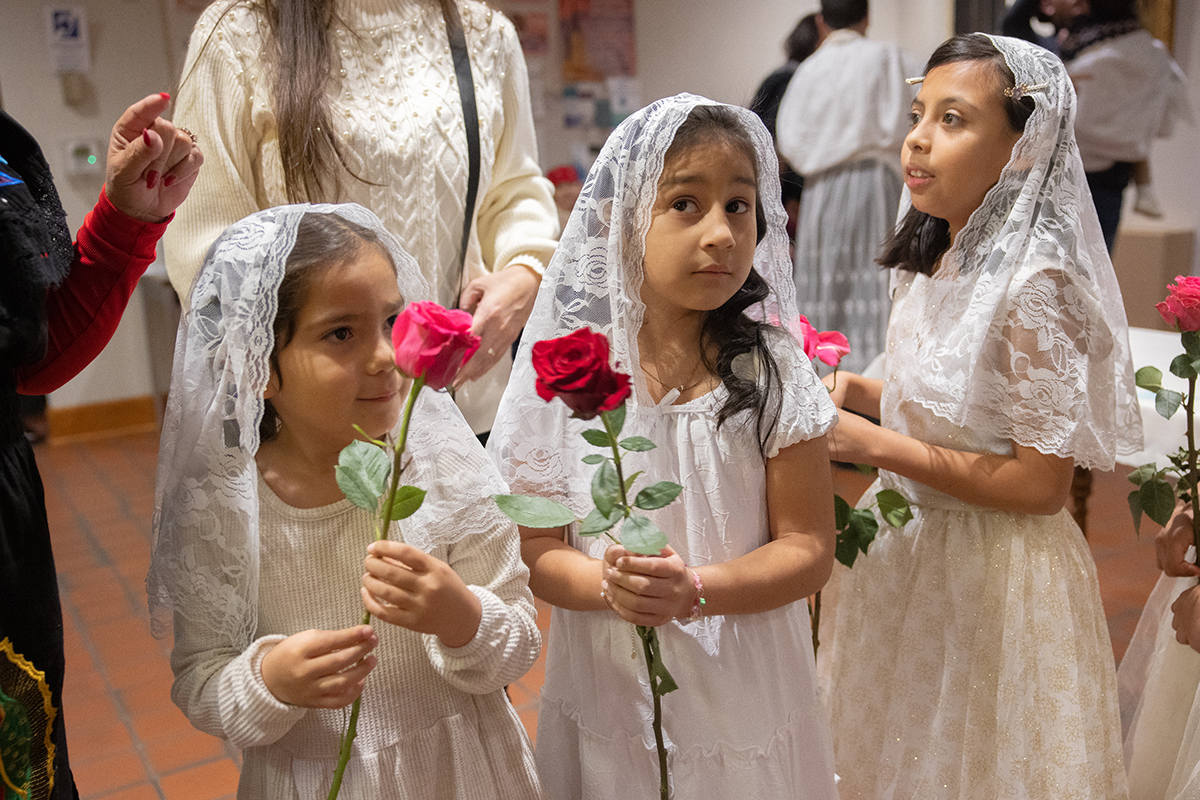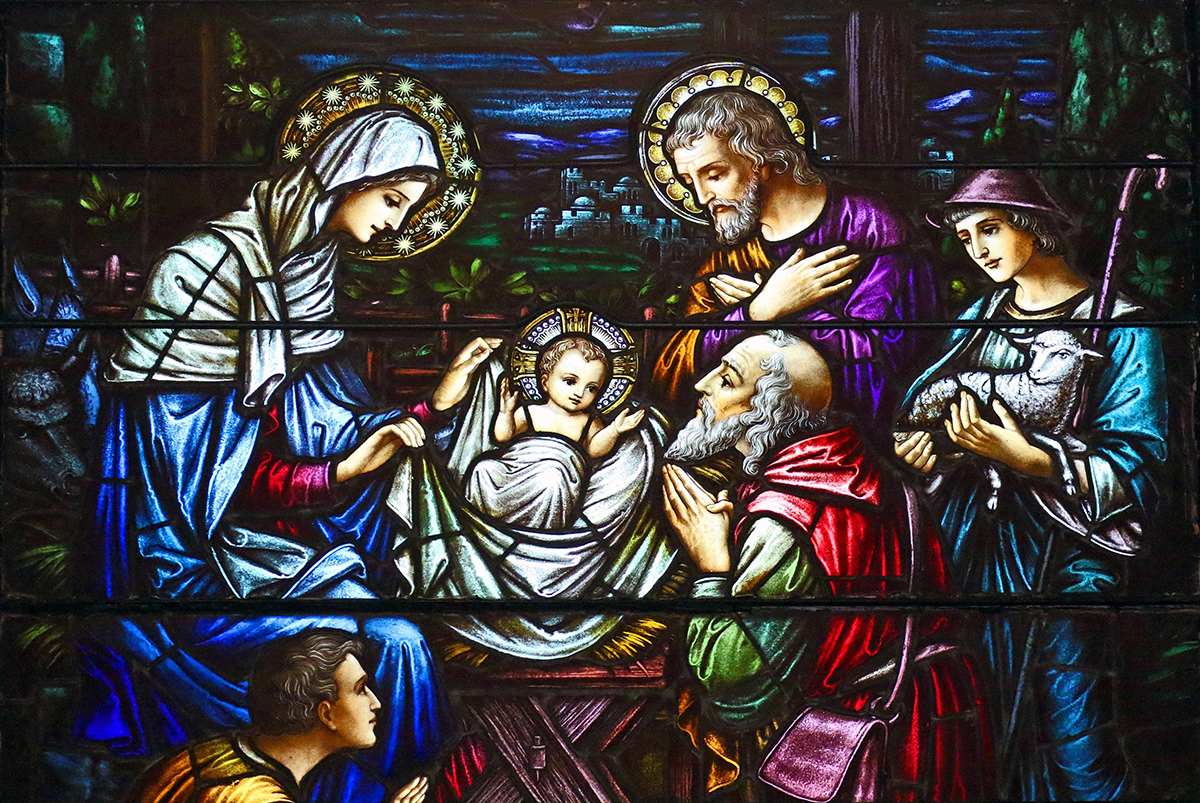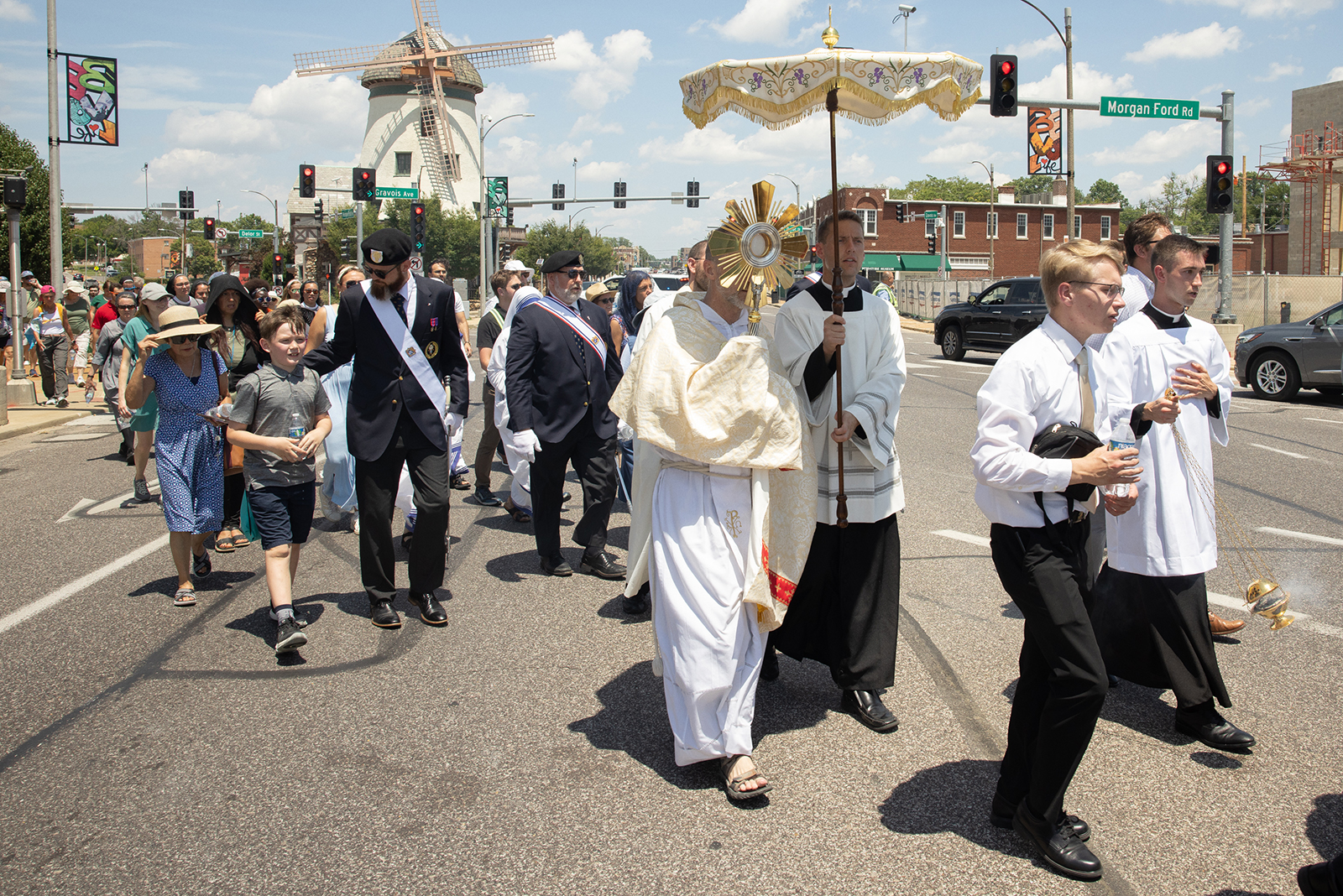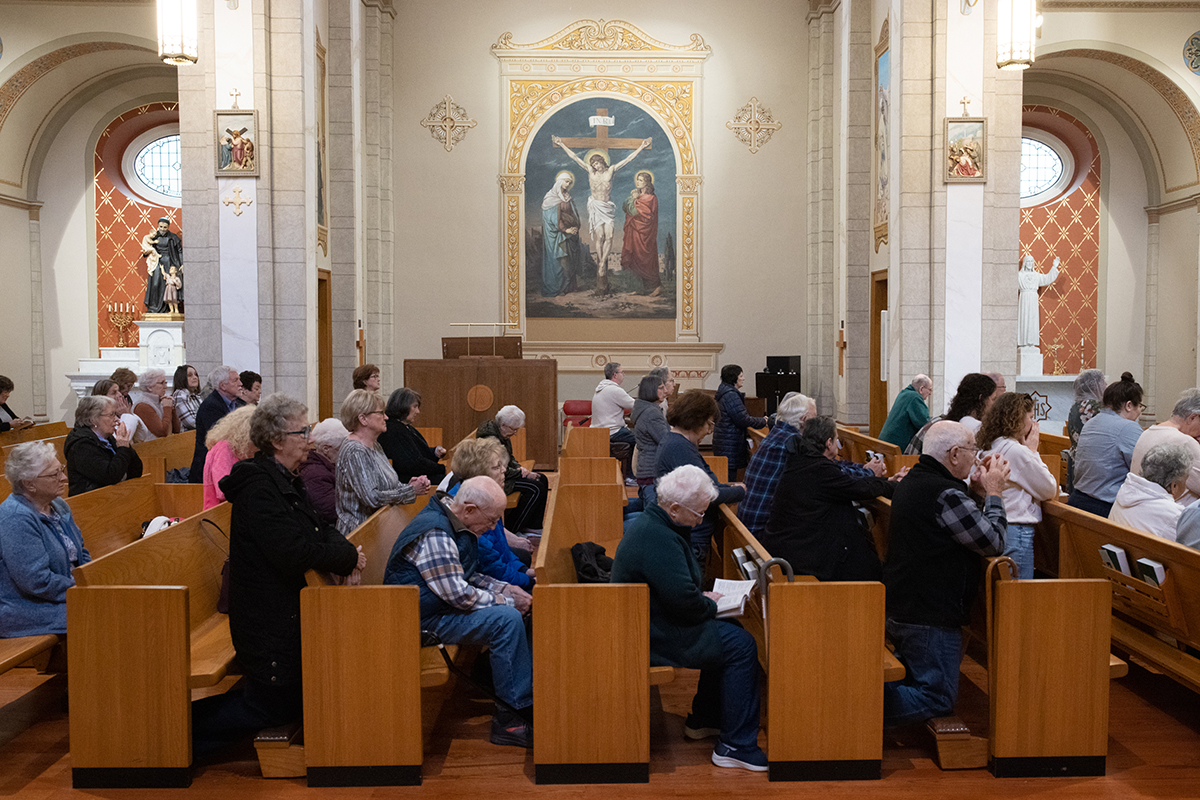Vigil draws awareness of human trafficking, calls others to action

A family member began selling the girl for sex at the age of 7.
The girl later described her life as a living hell. She had no one to which she could turn.
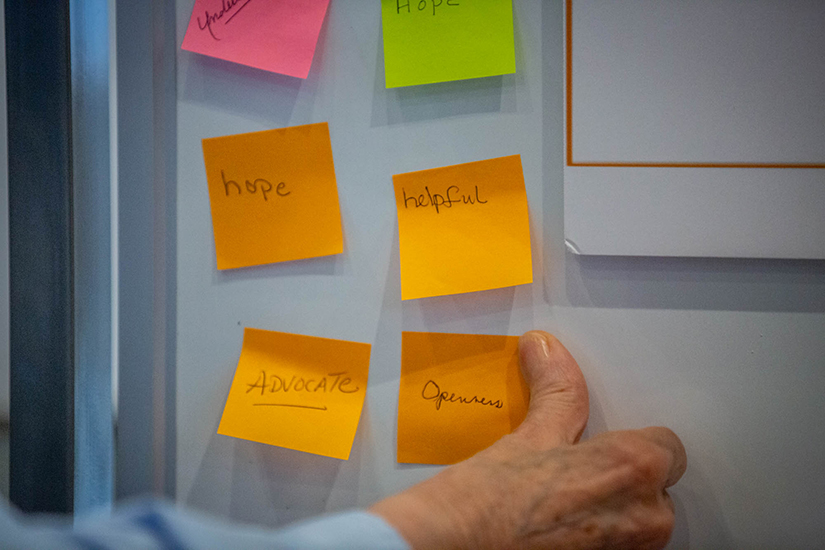
Some people attending a Feb. 10 prayer vigil let out an audible gasp hearing the details of her ordeal. It was one example of the thousands of children who are sex trafficked every year in the United States. The girl’s story, among other examples of human trafficking, were shared at the vigil, held at the Mercy Conference and Retreat Center in Frontenac.
Organized by the U.S. Catholic Sisters Against Human Trafficking, the prayer vigil drew almost 100 people on the observation of the World Day of Prayer and Awareness Against Human Trafficking and the Feb. 8 feast day of St. Josephine Bakhita, patron of human trafficking survivors.
“While anyone can fall prey to traffickers, it is often a crime that targets the most vulnerable … the poor and marginalized, those who have been discarded from society,” said Jennifer Reyes Lay, executive director of U.S. Catholic Sisters Against Human Trafficking. “I believe the principle cause is the unscrupulous selfishness of the many hypocrites in our world. Of course, arresting traffickers is an obligation of justice. But the true solution is the conversion of hearts — cutting off the man in order to dry out the market.”
Reyes Lay was hired in July as the first executive director of U.S. Catholic Sisters Against Human Trafficking, a collaborative, faith-based national network that offers education, supports access to survivor services and engages in advocacy to eradicate trafficking. The network, with headquarters at the Mercy Center in St. Louis, originated in 2013, becoming a nonprofit organization in 2015.
Among those helping in the global fight against trafficking are the world’s religious orders, particularly through the international Talitha Kum network sponsored by the women’s and men’s international unions of superiors general. The network includes 2,000 consecrated women and men and lay volunteers in 77 countries.
Sister Esther Hogan said that human trafficking is a global, human rights issue. The Sister of the Most Precious Blood of O’Fallon and other women religious and laypeople work with women in St. Louis who have been victims of sex trafficking and exploitation. Tigerlili Resources offers a drop-in center and transitional housing for women, and a program for men aimed toward disrupting the purchase of women and girls for sex.
Sister Esther also is the program director of the Bakhita Spiritual Companionship Program for women, which is expected to begin in the spring, and will provide mentoring to assist in restorative relationships, encourage growth and healing and create social support and connection.
“We can sit on the sidelines and be bitter, or we can be moved from compassion to social action,” Sister Esther said, calling the group to action.
The drop-in center, located in the Hamilton Heights neighborhood of St. Louis near St. Augustine Parish, provides a weekly luncheon for women and boutique where they can shop for clothing, personal products and other items. To date, the group has helped almost two dozen women with rehab and ultimately reconnecting with their families. “It’s a safe sanctuary where love, peace and joy are evident,” she said. “They’re putting love in action.”
“Love is a greater force for change than anything else in our world,” Sister Esther said. “The power of one becomes the power of many. That’s how we feel we’re going to take back St. Louis — one woman at a time, one block at a time, one life at a time.”
Take Action
Human trafficking in its many forms — from domestic servitude, forced labor and commercial sex trafficking and exploitation — affects more than 40 million people worldwide. It’s considered one of the largest criminal activities in the world, joining drug dealing and illegal arms industry, according to the U.S. Department of Homeland Security.
These are just a few of the many resources in the St. Louis area aimed at raising awareness of and eradicating human trafficking and exploitation:
U.S. Catholic Sisters Against Human Trafficking: A collaborative, faith-based national network (based in St. Louis) that offers education, supports access to survivor services and engages in advocacy to eradicate modern-day slavery. See www.sistersagainsttrafficking.org.
Tigerlili Resources: This local organization works with women and teenagers who are sexually exploited and trafficked and guides them to healing in Jesus Christ. Programs include Mighty Men of Valor, aimed at disrupting the purchase of women/girls; a drop-in center for women that offers a weekly community meal; a safe house providing shelter for survivors; and Bakhita Spiritual Companions, which provides compassionate listening and mentoring to walk the path of spiritual recovery. See www.tigerlilipb.org or contact Sister Esther Hogan, CPPS, at (636) 248-1117 or ehogan@cpps-ofallon.org.
The Covering House: Provides refuge and restoration to sexually exploited and trafficked children and teens. See www.thecoveringhouse.org.
Covenant House Missouri: Welcomes youth from 16-24 who are runaway, trafficked, at-risk or experiencing homelessness. See www.covenanthousemo.org.
Bakhita Law: A St. Louis-based nonprofit community organization that represents individuals affected by human trafficking and other forms of exploitation. It provides legal services, social service connections and education to represent and protect the human dignity of people who have been trafficked or exploited. See www.bakhitalaw.org.
National Human Trafficking Hotline: To report situations in which a person is forced to engage in an activity (commercial sex, housework, farmwork or any other activity) and cannot leave, call (888) 373-7888; or text HELP or INFO to 233733. The anonymous and confidential hotline is available 24/7 and operated by a nonprofit, non-governmental organization. See humantraffickinghotline.org.
U.S. bishops’ anti-trafficking program: www.usccb.org/about/anti-trafficking-program/
>> St. Josephine Bakhita
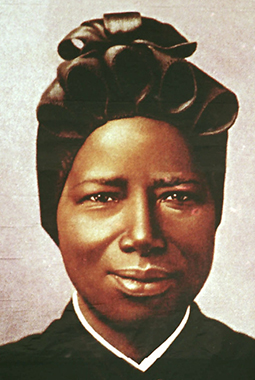
St. Josephine Bakhita, known as the saint of the Sudan, was born around 1869 and taken into slavery as a young girl. The sufferings she endured were so severe that she could not recall her name. Through the help of a group of religious sisters in Italy, she was freed from slavery in 1889. She spent her remaining years with the sisters and became known as a woman of great joy.
The International Day of Prayer and Awareness Against Human Trafficking is celebrated on or near the Feb. 8 feast day of St. Josephine Bakhita.
A family member began selling the girl for sex at the age of 7. The girl later described her life as a living hell. She had no one to which … Vigil draws awareness of human trafficking, calls others to action
Subscribe to Read All St. Louis Review Stories
All readers receive 5 stories to read free per month. After that, readers will need to be logged in.
If you are currently receive the St. Louis Review at your home or office, please send your name and address (and subscriber id if you know it) to subscriptions@stlouisreview.com to get your login information.
If you are not currently a subscriber to the St. Louis Review, please contact subscriptions@stlouisreview.com for information on how to subscribe.

